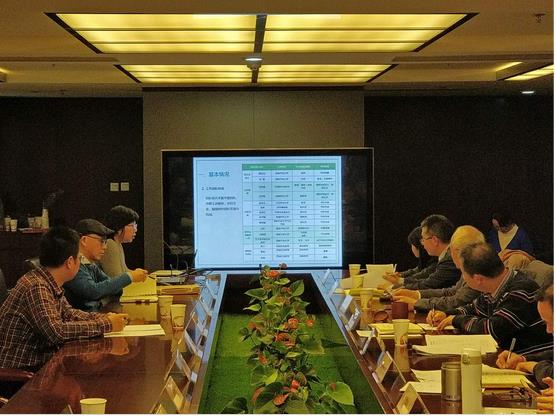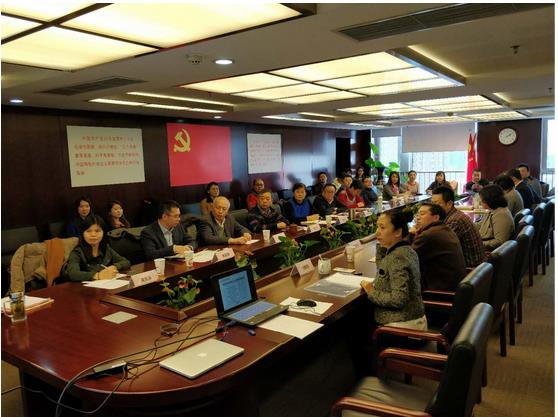 On 8th December, 2017, a special acceptance review meeting was held to evaluate the Continuing Education Base for National Professional and Technical Personnel (shortened to “the base”) of the Open University of China (OUC).
On 8th December, 2017, a special acceptance review meeting was held to evaluate the Continuing Education Base for National Professional and Technical Personnel (shortened to “the base”) of the Open University of China (OUC).

A total of six experts were invited to be judges at the acceptance review meeting and they evaluated 11 programmes integrating degree and non-degree qualification education and the programme for the construction of the base’s learning platform. The expert group is composed of experts in educational technology and educational reform, vocational education, vocational skill qualification appraisal, the Credit Bank, and project fund management. They included deputy secretary general of the Modern Distance Education Cooperation Group for National Colleges and Universities, Chen Geng; Operation Director of the National Vocational Qualification Network of the Ministry of Human Resources and Social Security (MOHRSS), Chen Mengfeng; deputy dean of the Office of Policy Research and the Research Institute of the Vocational Education Centre at the Ministry of Education, Zhou Fenghua; director of the OUC Academic Affairs Department, Ye Zhihong; director of the OUC Finance Department, Zhang Xuhong; and executive deputy director of the Credit Bank Management Office, Yan Xiaoping. A total of more than 20 personnel, including 11 persons in charge and coordinators from specialised areas, members of the learning platform construction programme research and development team, and staff members from the base participated in the review meeting, which was chaired by Yuan Songhe, deputy director of the Department of External Education and Professional Training.
On 14th July 2016, the OUC was officially approved as a National Professional and Technical Personnel Continuing Education Base affiliated to the OUC Department of External Education and Professional Training. Subsequently, in the second half of 2016, the MOHRSS allocated CNY 3 million to the OUC as one-time subsidy, which was to be used for the construction and operation of the base. A meeting of the OUC President's office decided that the subsidy fund was appropriated to special programmes set up in the teaching faculties and non-degree departments to focus on the integration of degree and non-degree education. The final 11 special programmes selected were: Financial Technology Practitioner Certificate Training Course System Construction (Faculty of Economics and Management), Information Technology Series Micro Course Construction (Faculty of Science and Engineering), Exploration of the Integration of National Teacher Training and Education (Faculty of Education and Teaching), Rational Drug Use by Senior Adults Online Course Construction (Faculty of Agroforestry and Medicine), Online Education Practitioners Ability Training System Construction (formerly the Teacher Development Centre), Training of Teachers for Calligraphy and Painting Courses for Senior Citizens (Faculty of Art Education), Curriculum System Construction for Specialties under the Junior-college Programme with Chain Management (the Experimental school), Curriculum System Construction for Education for the Elderly and Training of Pension Service Practitioners (Open University for Older Adults), Overseas Chinese Teaching Series Network Training Courses (Chinese Language Centre), Community Education Practitioners Training (MOE Research and Training Centre for Community Education), and Design, Promotion, and Practice for Dual Improvement of Job Competency and Educational Degree (School of Vocational Education and Training). In addition, in order to give full play to the advantages of the OUC’s educational informatisation, the OUC cooperated with a publishing house and developed a continuing education platform for professional technicians.
The director of the Department of External Education and Professional Training, Ma Ruolong, said that the original strategic goal of setting up 11 special programmes was to put together a professional design for the integration of degree and non-degree education, promote the research and incubation of non-degree programmes, and by relying on the Credit Bank, to promote the integration and development of non-degree and degree education. Consideration was given to the construction of curriculum resources and the requirements for the training of a teaching team for continuing education for professional and technical personnel, a necessary part of base construction.
The Acceptance Review Meeting was not only a review of the results of the above programmes but also functioned as a business exchange between degree and non-degree educational projects. The review included reports from the programme groups, achievement presentations, questions from the experts, and centralised review by the expert group. At the meeting, the experts reviewed the programmes with a focus on the design ideas, the implementation process, and the final results. On the whole, the experts thought highly of the achievements made by the programmes, including the integrated design of degree and non-degree education, the production of micro video resources, and the inclusion of teacher training (seminars). They also affirmed the design of micro video resources which could be used for both degree and non-degree education. The expert group also put forward opinions and suggestions on the current state of the programs. They believe that the focus should be placed on exploring the future operation model of the programmes and that the final results of some programs needed to be further improved.
During the programme review process, the expert group highly praised the following programmes: Rational Drug Use by Senior Adults, Online Education Practitioners Ability Training System, Exploration for the Integration of National Teachers Training and Education, Training of Teachers for Calligraphy and Painting Courses for Senior Citizens, and International Chinese Language Teachers Training. The programmes were praised for their design and the strong applicability and professionalism of the course resources. This is of important significance for promoting the programmes, which have good application prospects in the future in non-degree educational and vocational training and comply with the essential content of the MOHRSS’s Talent Knowledge Ability Renewal Programme.
It was pointed out during the meeting that the acceptance and evaluation of the programmes is a demonstration of the initial achievements of the base construction, marking a step forward in the construction of the base and laying a good foundation for its future development. In the future, the base will give full play to the advantages of OUC’s disciplines, school running organisation system, information technology, and the Credit Bank to further promote two-way mutual recognition and integration between degree and non-degree education, explore new business models, and provide better services for the continuing education of professional and technical personnel in China.
 By Yuan Songhe,OUC
By Yuan Songhe,OUC